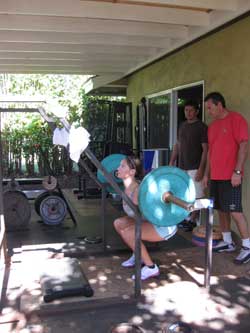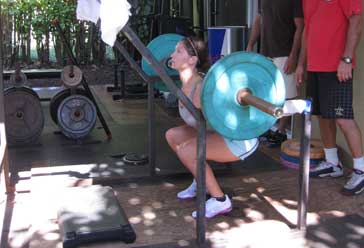
Going for Broke
All medals are not made equal; some change lives. It was February, 2006, at the Torino Winter Olympics. The bad weather and pressure of The Games kept the giant slalom favorites from pushing their times. Then, in a flash, they were ambushed by a young American named Julia Mancuso. She ascended the winner’s podium, tiara affixed, in a true “Cinderella story.”
I first met Julia in 2005 in Hawaii when the cute, 21-year-old quietly entered the gym and made her way through her workout regimen without making much noise. The youngster’s arms and legs were long, and her body well proportioned, reminding me of my idol, the Italian skier Deborah Compagnoni who took home three straight Olympic gold medals in the giant slalom.
I was only able to break into the top 20 in the world during my career, so I always had a great interest in seeing what the top ranked skiers had that I didn’t.
Since I had turned to Pilates to improve my performance and functional recovery, I knew spending time with Julia would do the same for her and offer me some great first-hand research. Thus, I made the decision to tour with Julia throughout her 2008 season in Europe.
Although Julia is known for her audacious performances on the slopes, off the hill she was rather shy and quiet, so it took quite some time for me to learn all the details surrounding her injury and its seriousness.
In the spring of 2005, Julia underwent hip surgery for an injury much more uncommon than the typical knee surgeries most skiers endure and then come back to compete. Athletes deal with the pain, practice and continue to compete, which usually leads to bigger problems.
For Julia the problems began in 2009 when she started to experience lower back pain right before the season opened. The results were devastating. From mid-January the painful days came and competitions found her at the finish line in tears. A staff member who had worked the line for years told me, “This was first time I saw her cry.”
Even with her seemingly limitless power to overcome and remain positive, it was too much for her to bear. Sponsors and those around her began to think the glory of the Olympic gold had weakened her, and the cold stares reflected their ever-decreasing expectations. Her world ranking plummeted, and she faced a difficult summer in the year before the Whistler Olympics.
The season ended in March, and in May I met up with Julia in Hawaii. She had just finished her physical fitness testing at the U.S. ski team’s training center in Utah, and the assessment was her worst in years. The trainers and coaches had all wanted to confirm the numbers and prepared themselves for the disappointment, but still all were discouraged by the results.
With only 10 weeks until the next ski camp, Julia had a limited amount of time to regain both her health and her strength. In order to prove at the August/September camp that she still had the goods, she would first require a healthy and stronger body.
Julia’s Weekly Workout Program
Bicycling: Every day
Water Activities: Every day
Therapy and Treatment: 5 days
Pilates: 3 days
Gym Workouts: 3 days
Beach Sand Training: 1 day
Last year Julia spent her summer climbing Mt. Kilimanjaro and working the Summer Olympics for a TV station. However, this year she stayed in Hawaii. Her coach and trainers flew in to advise her on her workout schedule, and I worked along side her during the beach and gym training sessions.
Our muscles became more relaxed as the blood was pumping, and we noted that, in addition to gaining strength, we were burning fat. Additionally, I noted how Julia’s presence and her level of concentration were rubbing off on me.
Compared to the whirlwind of last summer, this trip to Hawaii may have included more quiet time for Julia, but like a lion in wait, she was setting her stance and focusing her glare on her prey, the 2010 Winter Olympics.
Whether the effort was “too late” or “just in time,” no one knows. You can only concentrate on the here and now. Will the dramatic 2006 gold medal continue to haunt her, or push her to race down the hill faster than the other contenders? It’s been 12 years since I competed in the 1998 Nagano Olympics and, although I won’t be there as an athlete this time, I’ll be just as focused on bringing home our team a medal.
